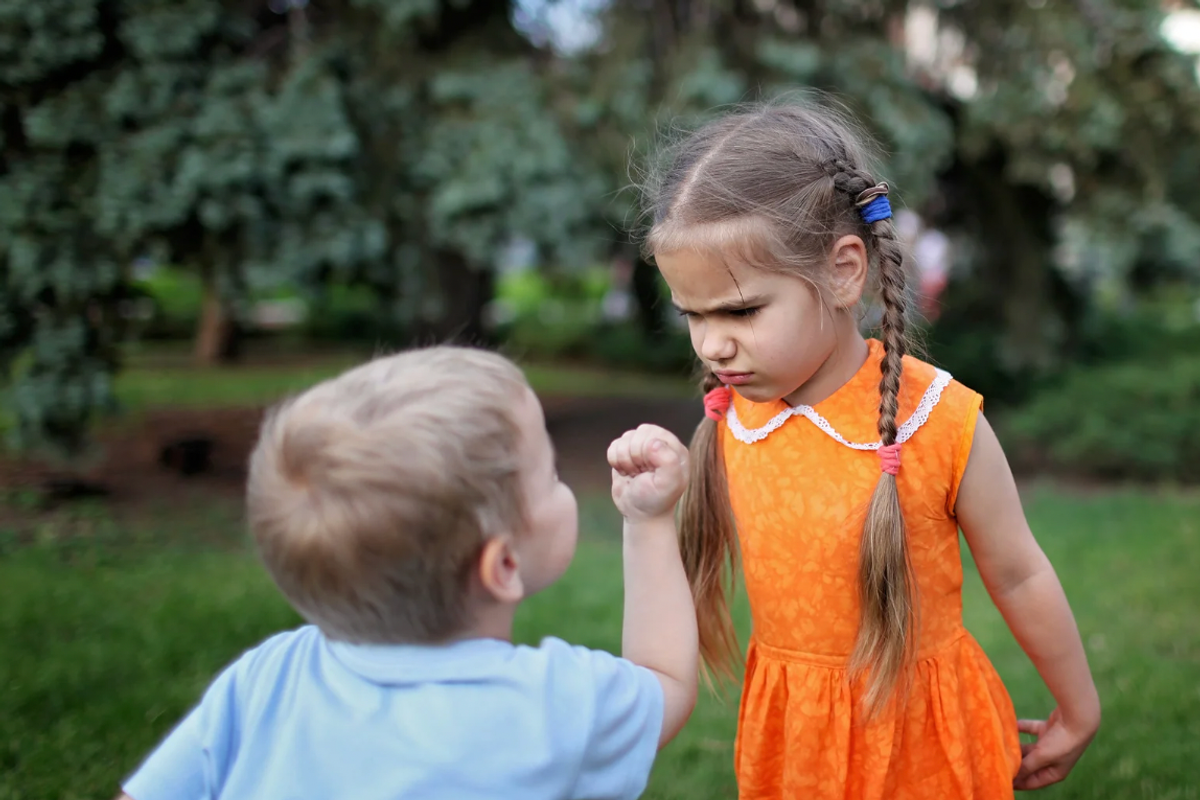Mom reveals what most parents fail to realize when teaching their kids about bullies
It's a hard truth to face, but an important one.
Kids don't always know how their actions affect others.
There are a lot of resources and conversations out there focused on teaching kids how to deal with bullies. But what about when it’s your own kid who’s doing the bullying?
Or course, that can be a hard reality to face. Virtually no one raises their kiddo to be a bully. But children, as innocent as they aren’t, aren’t born fully knowing boundaries and consequences. And without being taught these things, lines get crossed.
And this is the very valuable point that Rachel (@rachel.the.editor) made in a clip posted to her TikTok, where she challenged the common language used in most anti-bullying tactics.
@rachel.the.editor Just a thought
“Have we ever considered the fact that anti-bullying messaging for kids is often centered around the victim and some anonymous evil bully and never teaching kids to recognize when they are being the bully?” she asked.
Gong further, she added that while she doesn't think kids are “inherently evil,” they don’t necessarily “have the emotional maturity to know the effect that they’re having on other kids.”
Therefore, she argued that it’s just as, if not more important, that we teach kids how to recognize bully patterns within themselves, and not just “learning how to deal with this anonymous, shapeless, evil bully figure.”
Rachel certainly has a point. We’ve all seen the usual victim/villain dynamic, both in anti-bullying education…and pretty much every movie centered around an adolescent. Some Biff-type shoves the outcast kid into a locker. Or a Regina George-esque mean girl spreads nasty rumors. Either way, they get their rightful comeuppance by the time the credits roll.

But of course, real life doesn't work that way at all. In real life, kids aren’t going to see their teasing or antagonizing as “bullying,” because they don’t want to see themselves as the “bad people” bullies must surely be, given the examples they've been given.
Judging by the comments, folks have also noticed how the current way of doing things falls a little flat.
“The amount of times I've talked to kids being ‘bullied’ only for it to turn out they are the ones antagonizing the other students,” one person wrote. “No one wants to play with you because when you lose you hit them!”
Another added, “YES cuz usually the ‘bully' =; in these existing stories is so cartoonishly evil that real life bullies probably go ‘Obviously that’s not me, I’m just messing around and having fun. They’ve no clue.”
Yet another said, “Kids aren’t going to come home from school like 'mom I’m bullying someone.' They’re going to say 'there’s this weird kid at school.’ Parents never think their kid is the problem…”

While it can be hard for parents to come to label their sweet kiddo as bullies, it can serve as an impactful opportunity for growth. After all, they're still learning how to navigate this thing called life, and are bound to make mistakes along the way. But if we can use those mistakes to teach things like empathy and emotional regulation, rather than simply instilling punishment for "bad behavior,” they can take those lessons with them into adulthood.
It’s also worth noting that seeing bully-type behavior doesn’t make you a bad parent. According to the American Academy of Pediatrics (AAP), it can’t always be 100% prevented. However, they say that “you can help him build coping skills to deal with difficult situations. Spend time with your child, show him love and encouragement, and model good behavior toward others. Talk through difficult situations with your child so he knows he can trust you with his problems.”
Bottom line: while it’s important to teach kids how to stand up to the potential bullies in their life, it’s equally vital to teach them accountability. Luckily, kids are pretty darn receptive.
- This anti-bullying PSA acts out online comments in real life. It's an uncomfortable watch. ›
- Dad found out his son bullied a kid at school and came up with a brilliant teaching moment ›
- This Kid Was Bullied A LOT. He Could Have Told His Teacher Or His Principal. He Had Bigger Plans. ›
- Parent shares how they handled their kid being a bully - Upworthy ›

